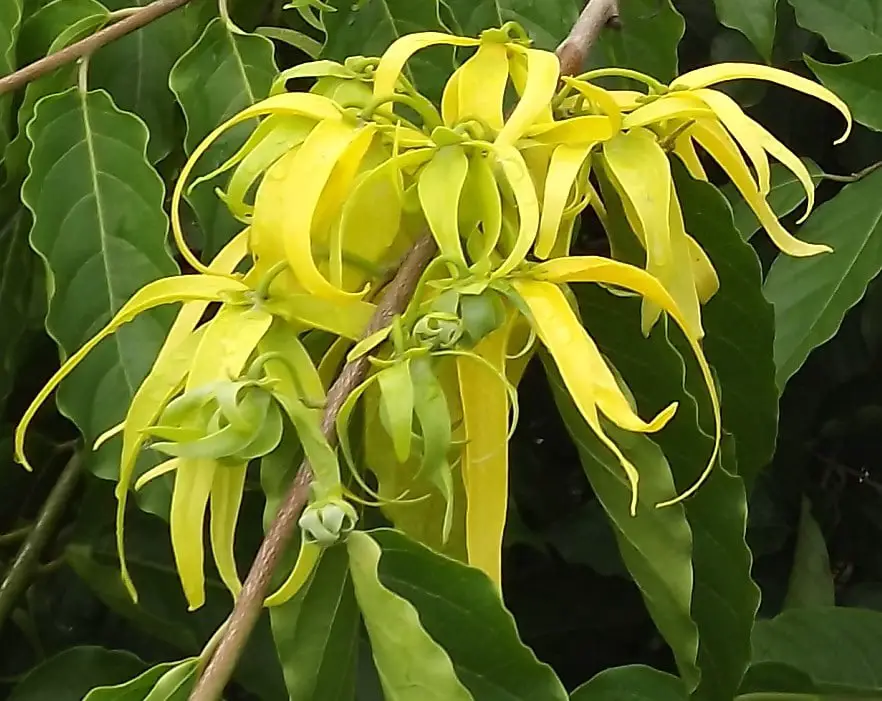Ylang-Ylang was not a well-known as an essential oil until recently, but it’s amazing health benefits helped it to quickly soar in popularity and land a front row seat in many people’s bathroom cabinets. The essential oil of the plant is extracted by steam distillation of the fresh flowers of the Ylang-Ylang tree (commonly found in Asian rainforests). The primary components of the essential oil of Ylang-Ylang are benzyl acetate, benzyl benzoate linalool, caryophyllene, geranyl acetate, methyl benzoate, p-cresyl methyl ether, and other components known as Sesquiterpenes.
These all contribute to its aroma and medicinal properties. In this article we will look at five health benefits that Ylang-Ylang possesses so that you can incorporate it into your shower routine.

#1 as an Antidepressant
One of Ylang-Ylang’s oldest medicinal properties is its ability to help battle depression. It relaxes the body and the mind. Using this essential oil in aromatherapy helps to drive away anxiety, sadness, and stress – some of the main causes of depression in many people. As a result, the oils often have an uplifting effect on the mind that can cause feelings of joy and hope. If you’re feeling a little low it might be worth adding this essential oil to your bath or shower.
#2 Antiseborrhoeic Properties
Seborrhoeic Eczema is an awful disease that is caused by malfunctioning sebaceous glands. This disorder results in irregular sebum production and infection in the epidermal cells as a result of this. It is incredibly painful, since the white, or pale yellow, skin starts peeling off. This normally happens on the scalp, cheeks, eyebrows and wherever else hair follicles are found. Ylang-Ylang essential oil can be beneficial in relieving this inflammatory situation and reducing the skin irritation and redness by regularizing sebum production and treating the infection itself.
#3 Antiseptic Properties
Cuts, abrasions, and burns all run the risk of succumbing to various bacterial infections, such as sepsis or tetanus. Ylang-Ylang can help to prevent these infections by inhibiting microbial growth and disinfecting wounds. These properties in the essential oils can help to protect wounds from bacterial and fungal infections, as well as viruses. The oils also aid in speeding up the healing process for small injuries. These properties have long been used in Asia to clean and disinfect wounds, and there is a lot of truth in the methods used for the prevention of infections.
#4 as a Sedative
The Ylang-Ylang essential oils provide a great deal of relief from stress and anxiety, which is incredibly beneficial to your overall mental health. They sedate nervous afflictions, and you are able to use an easy and natural solution, as opposed to medications that have the potential to become addictive. If used carefully and in the prescribed quantities there are no adverse side effects to using this oil as a calming treatment to relax the mind. When you’ve had a long and stressful day, be sure to use some of the Ylang-Ylang essential oil during your evening bath and shower. It’s important to remember that your mental health is just as important as your physical condition.
#5 as an Aphrodisiac
The stresses of everyday life can cause a great deal of anxiety, depression, and general feelings of being overwhelmed by the sheer amount of work you have to do. As a result, many people can find themselves losing their sex drive and therefore find themselves frustrated by the lack of it. The Ylang-Ylang essential oils can help you to regain your sex drive and your passion and works very well as a natural remedy. By simply using them in the bath and shower you will often feel more relaxed and the effects of the plant as an aphrodisiac will begin to occur. Many people find themselves with their sex drive back in no time.
Author Bio:
 Will is a freelance writer, his blog can be seen here . If you are interested in health benefits that can be gained from the daily use of steam showers, be sure to check out more of his steam and shower articles here. Follow Will on Facebook or Google+
Will is a freelance writer, his blog can be seen here . If you are interested in health benefits that can be gained from the daily use of steam showers, be sure to check out more of his steam and shower articles here. Follow Will on Facebook or Google+












